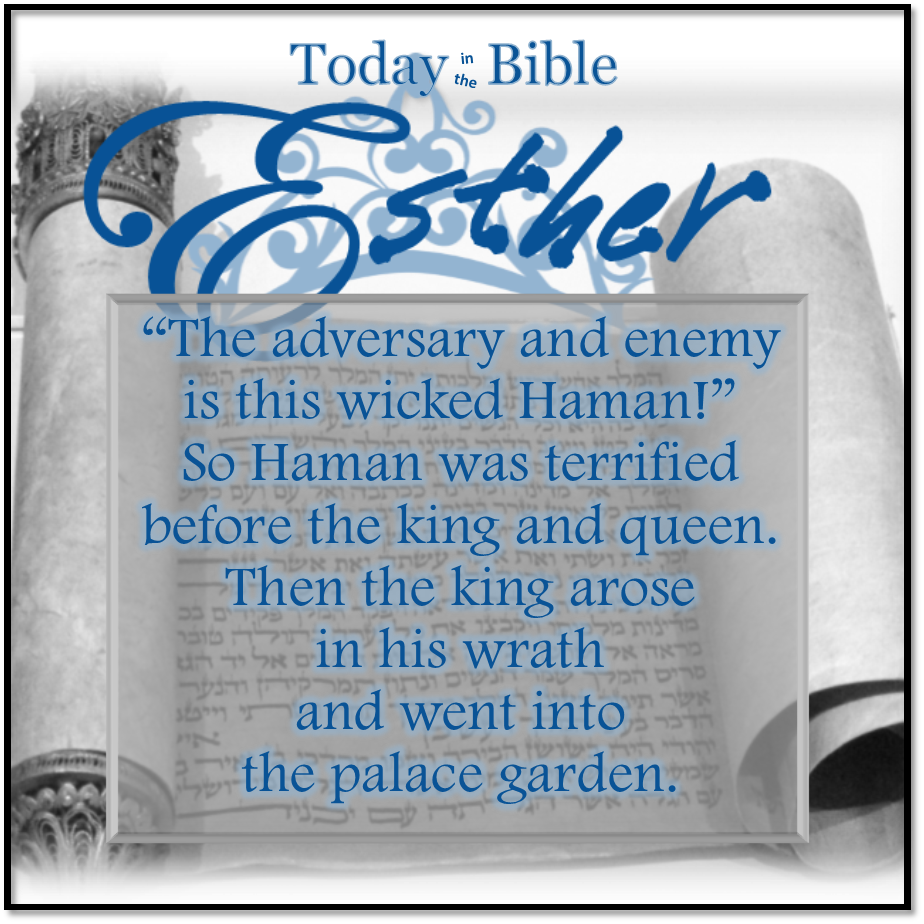Nisan 16, 5784; from sunset April 23, 2024, to sunset April 24, 2024

Esther is the Persian name of a Hebrew girl named “Hadassah.” Hadassah originates in the Hebrew “hadas” which means “myrtle.” The name Esther could either be from the Persian word for star (setareh) or the Median word for myrtle (astra). The myrtle tree produces a star-shaped flower which may be the connection between these words.
Earlier today we remembered how the king could not sleep and discovered that Mordecai had performed an act of salvation which benefitted him. The king then desired to honor Mordecai for this great service. Haman, who had come to request permission to execute Mordecai, instead found himself tasked with parading him around in a royal robe and crown, paying homage to the man he wanted dead. Now, we’ll see how the tables were turned on Haman and Mordecai was elevated into his place in the kingdom.
So Haman took the robe and the horse, arrayed Mordecai and led him on horseback through the city square, and proclaimed before him, “Thus shall it be done to the man whom the king delights to honor!” Afterward Mordecai went back to the king’s gate. But Haman hurried to his house, mourning and with his head covered.
When Haman told his wife Zeresh and all his friends everything that had happened to him, his wise men and his wife Zeresh said to him, “If Mordecai, before whom you have begun to fall, is of Jewish descent, you will not prevail against him but will surely fall before him.” While they were still talking with him, the king’s eunuchs came, and hastened to bring Haman to the banquet which Esther had prepared.
So the king and Haman went to dine with Queen Esther. And on the second day, at the banquet of wine, the king again said to Esther, “What is your petition, Queen Esther? It shall be granted you. And what is your request, up to half the kingdom? It shall be done!”
Then Queen Esther answered and said, “If I have found favor in your sight, O king, and if it pleases the king, let my life be given me at my petition, and my people at my request. For we have been sold, my people and I, to be destroyed, to be killed, and to be annihilated. Had we been sold as male and female slaves, I would have held my tongue, although the enemy could never compensate for the king’s loss.”
So King Ahasuerus answered and said to Queen Esther, “Who is he, and where is he, who would dare presume in his heart to do such a thing?”
And Esther said, “The adversary and enemy is this wicked Haman!” So Haman was terrified before the king and queen. Then the king arose in his wrath from the banquet of wine and went into the palace garden; but Haman stood before Queen Esther, pleading for his life, for he saw that evil was determined against him by the king.
When the king returned from the palace garden to the place of the banquet of wine, Haman had fallen across the couch where Esther was. Then the king said, “Will he also assault the queen while I am in the house?” As the word left the king’s mouth, they covered Haman’s face.
Now Harbonah, one of the eunuchs, said to the king, “Look! The gallows, fifty cubits high, which Haman made for Mordecai, who spoke good on the king’s behalf, is standing at the house of Haman.” Then the king said, “Hang him on it!” So they hanged Haman on the gallows that he had prepared for Mordecai. Then the king’s wrath subsided.
On that day King Ahasuerus gave Queen Esther the house of Haman, the enemy of the Jews. And Mordecai came before the king, for Esther had told how he was related to her. So the king took off his signet ring, which he had taken from Haman, and gave it to Mordecai; and Esther appointed Mordecai over the house of Haman. – Esther 6:11-8:2 (NKJ)




You must be logged in to post a comment.